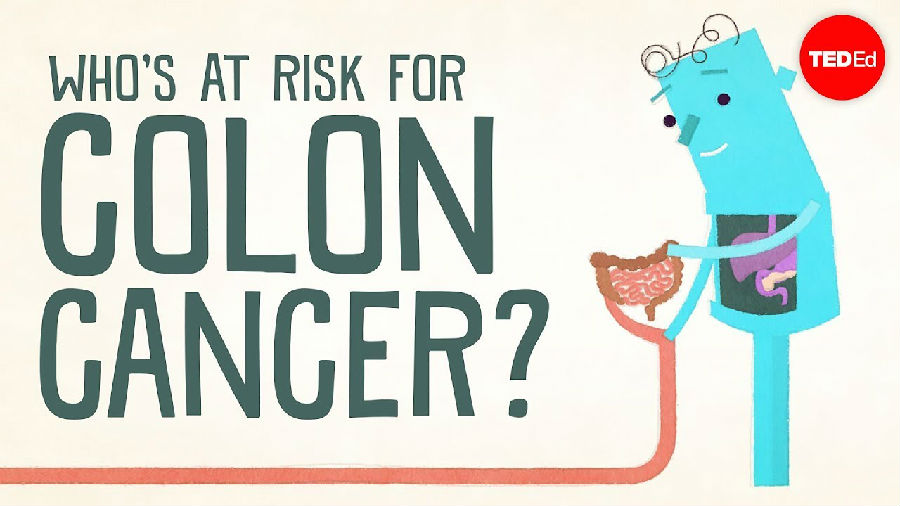(单词翻译:单击)
If you were to lay your digestive tract out in a straight line, it would form a tube spanning nearly ten meters.
如果你把消化道拉直成线,它将形成一条长约十米的管子。
The last 1.5 meters of that are called the colon, or large intestine.
这条管子最后1.5米的部分称为结肠,或大肠。
Cells in this organ's lining constantly renew themselves,
大肠内壁的细胞不断地更新,
but the genes that moderate this process occasionally go awry, leading to the excessive growth of new cells.
但是调节这个过程的基因有时候会出错,导致新细胞过度地增生。
That results in small growths or abnormal clumps of cells called polyps.
结果是称为“息肉”的赘生物或不正常细胞组织。
The majority of these polyps won't do any harm,
大多数的息肉对身体无害,
but some can become cancerous when their cells begin to grow and divide rapidly, projecting further into the colon.
但有些会有癌性,这就是当息肉细胞不断增生和迅速分裂,往大肠内增殖。
At that point, they can transform into colon cancer,
这时候,肿瘤可以演变成大肠癌,
one of the most prevalent and preventable forms of cancer in the world.
世界上最普遍但最可预防的一种癌症。
That's a slow process:
癌症发展缓慢:
though growth times vary, it often takes around ten years for a small polyp to grow and develop into a cancerous one.
虽然癌症生长期不定,但通常一小簇息肉须花十多年时间增生和发展成癌性肿瘤。
We don't know exactly what causes the majority of colon polyps and colon cancers.
我们还不确定什么导致大多数的大肠息肉和癌症的形成。
We do know in general that colon cancer involves the activation of what's called oncogenes in the polyp,
我们知道的是通常大肠癌的形成是跟息肉里的致癌基因被激活有关,
and/or the loss of tumor-suppressor genes that usually keep cancer cells in check.
又或者跟控制癌症细胞的肿瘤压抑基因有关。
Most cells have proto-oncogenes that help them grow.
大多数细胞有帮助它们增生的原始致癌基因。
When a proto-oncogene mutates, or there are two many copies of it,
当原始致癌基因突变或数量太多,
it can become a permanently active oncogene with cells that grow out of control.
它可以持久地激活致癌基因导致细胞不受控制地增生。
While we don't yet know exactly what underlying factors cause these changes,
我们还不确定什么因素导致这些突变,
experts suspect a combination of both environmental and inherited genetic factors.
但专家怀疑环境和遗传为主要因素。
In the worst cases, when cells within polyps divide and spread unchecked,
最糟情况是当息肉细胞不受控制地分裂和散开时,
they eventually break through the lining of the colon.
它们会最终穿破大肠内壁。
Lymph and blood vessels carry those cells all over the body, and they can go on to form tumors.
淋巴管和血管把这些细胞运输到身体各个部位,然后这细胞会继续形成新肿瘤。

Despite these challenges, there's a solution.
尽管这些挑战,我们并不是束手无策的。
We've become extremely good at detecting and removing offending polyps before they can cause cancer.
我们变得更擅长于检测和消除侵袭性的息肉,避免它们演变成癌症。
This happens through a process called screening, and when we do it regularly, we can prevent many cases of colon cancer.
这是通过称为筛检的过程,而如果定期进行,我们可以避免许多大肠癌的案例发生。
So, who's at risk? Most cases occur in people aged 50 years or older.
那么,谁有罹患大肠癌的风险?大多数案例发生于50岁或以上的人士。
This group is considered at average risk for colon cancer or colon polyps.
这群人拥有中等的风险罹患大肠癌或长大肠息肉。
There's also a higher risk group that includes people with personal or family histories of colon polyps or cancer,
也有一群拥有更高风险的群体,这包括个人或家族历史曾有患过大肠息肉或癌症的人,
and those who suffer from inherited genetic syndromes, or inflammatory diseases, like Crohn's disease and ulcerative colitis.
以及那些患上遗传性综合症的人,或者是患有炎性疾病的人,如克隆氏病和溃疡性结肠炎。
So the best age to initiate screening varies from person to person.
所以开始进行筛检的最佳年龄因人而异。
If you have access to healthcare, it's best to consult a doctor to find out when you should begin.
如果你可享有医疗服务,最好跟一位医师咨询你什么时候可以开始进行筛检。
Screening can be done with various tests. Colonoscopy involves a long, thin, flexible tube
大肠筛检可包括许多不同种类的测试。肠镜是一支细长可弯曲的管子,
that's fitted with a video camera and light at the end and placed internally to examine the colon for polyps.
尾端则装上一台摄像头和灯,并插入大肠以检测息肉。
If polyps are found, a doctor can do a polypectomy, a procedure that removes polyps from the colonic wall.
如果发现息肉存在,医生可以进行息肉切除术,把息肉从大肠内壁切除。
Doctors can also then test the polyp for cancerous cells.
医生然后通过息肉来检查癌细胞的存在。
Colonoscopy is the only test that can be used to both find and remove polyps.
做肠镜检查是唯一一个能同时检测和切除息肉的测试。
There are, however, other useful screening tests,
虽然如此,也有其它有用的测试,
including imaging and at-home tests that can allow patients to examine their stool for small amounts of blood.
这包括成像测试以及一些病人可在家使用的测试器来检测粪便是否含有血液。
Occasionally, polyps are too large to be removed during a colonoscopy, in which case, the next step is surgery.
有时候息肉太大,做肠镜时不能切除,这时候下一步就是做手术。
If blood and imaging tests then reveal that cancerous cells have spread outside the colon,
如果血液和成像测试都显示癌细胞已经扩散到大肠以外,
then a special treatment, like chemotherapy, may also be required to stop the cancer from escalating.
特别的治疗如化疗,就可能需要进行来停止癌症恶化。
We can also take on certain habits to reduce our likelihood of developing colon cancer in the first place.
癌症形成前,我们可以养成某些特定的习惯来减低罹患大肠癌的风险。
There's evidence that maintaining a healthy weight, not smoking, and being physically active can help.
证据显示保持健康的体重,不抽烟和常做运动可帮助减低风险。
But most importantly, access to healthcare and regular screenings at crucial times in life are the best ways to prevent colon cancer.
但最重要的是,拥有医疗服务和在生命关键时期定期做筛检是预防大肠癌的最佳方法。


